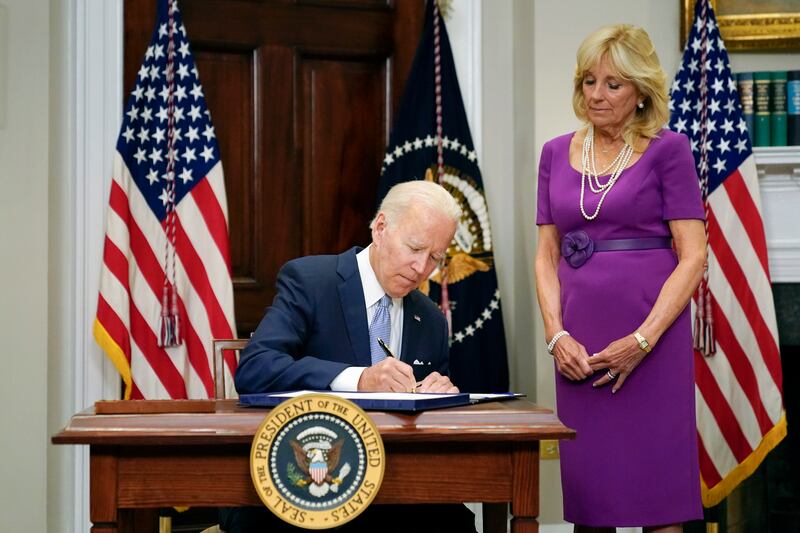This article was first published in the State of Faith newsletter. Sign up to receive the newsletter in your inbox each Monday night.
Faith leaders committed to fighting gun violence say the recently passed Bipartisan Safer Communities Act is a step in the right direction. But they also believe the country still has quite a ways to go.
“Don’t think this is the end of the ballgame,” said the Rev. Michael McBride, executive director of the faith-based organization LIVE FREE during a July 20 press call.
Moving forward, lawmakers and other community leaders must improve many aspects of violence prevention efforts, including how long they last. Too often, officials abandon promising programs before activists have a chance to show their worth, said the Rev. Ciera Bates-Chamberlain, executive director of LIVE FREE Illinois.
“We can’t give it two years and say we’re going to throw it out the window,” she said.
Another persistent issue is getting public funds to the right place. In many cases, grassroots organizations embedded in neighborhoods struggling with gun violence are forced to get by with very little government support, said the Rev. Rhonda Thomas, executive director of Faith in Florida, during the press event.
“The fact that a bipartisan bill was actually created and that funding was included in that bill sounds like a plus, but we are often disappointed because funding doesn’t reach the grassroots organizations doing this work all the time,” she said.
In addition to setting aside more money for violence prevention, the bipartisan gun law, which was signed by President Joe Biden in late June, expands access to mental health services and creates a new, more in-depth background check process for adults age 21 or younger who are looking to buy a gun.
Many of the faith leaders who took part in the recent press call were able to attend the White House celebration in honor of the new policy. But other speakers described being turned away from the party, likely because they got involved in gun violence prevention only after being convicted of a crime and spending time in prison.
“The dispassionate way we were dismissed just was insulting,” said the Rev. Joseph Paul, managing director of the Los Angeles Regional Reentry Partnership, noting that he was held for 45 minutes at the entrance to the White House gathering before being turned away.
Situations like what the Rev. Paul described show that there’s still not a seat at the table for everyone affected by the gun violence debate, the Rev. McBride said, adding that if you’re closing the door on some stakeholders, you’re missing opportunities to come up with the best possible solutions.
Leaders at “every level of the government can cause us to still feel as if our highest of highs must be accompanied by the lowest of lows,” he said.
Fresh off the press
The abortion ruling reopened the debate on same-sex marriage. What will happen next?
Andrew Wiggins is an NBA champion. But he still regrets getting vaccinated
Term of the week: Sofer
A sofer is an expert on the maintenance and restoration of Torah scrolls, the sacred texts used by Jewish congregations. These scribes travel the country and world consulting with Jewish community leaders in order to decide how best to fix scrolls that have fallen into disrepair and protect the ones that haven’t.
Last week, Rabbi Moshe Druin, a sofer based in Miami, visited Utah to work on the Torah scrolls at Congregation Kol Ami in Salt Lake City. My colleague Trent Toone visited with him to learn more about his work.
“It’s a very specialized art, mastering that Hebrew calligraphy on parchment. We use feathers and ink in the same way it’s been done for thousands of years,” Rabbi Druin told the Deseret News.
What I’m reading ...
A group of archaeologists with the Colonial Williamsburg Foundation is currently at work digging up the graves of members of one of the first Black churches in the U.S. The graves had been covered by a parking lot before community members pushed for the excavation in hopes of doing a better job understanding and honoring the past, my friend, Daniel Silliman, reports for Christianity Today.
At first glance, Sock Religious, a company that sells socks with images of Catholic leaders and saints on them, seems like a joke. You might think that Catholics only buy the socks as gag gifts or stocking stuffers. But when you actually ask customers how they feel, surprisingly poignant stories emerge, according to America magazine. “A lot of women will wear them while they’re giving birth. ... It’s just beautiful to have a tangible, physical reminder that the saints are always with us,” one of the company’s leaders said.
The New York Times opinion section did something special last week: It published eight essays from established columnists based on the theme of “I was wrong.” The writers revisited issues they’d addressed in the past and expressed their regrets or described changes of heart. For example, Gail Collins wrote that she wished she hadn’t written so much about Sen. Mitt Romney’s dog.
Odds and ends
I recently fell back in love with reading after many months spent wishing I could read more (and never actually making time for it.) Here’s a lovely column from Vox’s Alissa Wilkinson about how to redevelop a reading habit by following a few easy steps.
Your feel-good read of the week: This couple has been married for 79 years after meeting at church at 19. Here are their secrets to relationship success.


 alt=Kelsey Dallas
alt=Kelsey Dallas